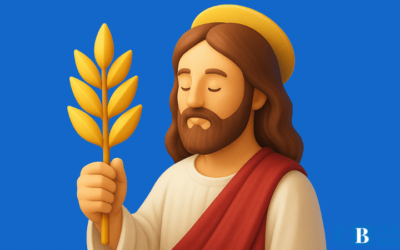The shortest book in the Bible is 2 John, an epistle written by the apostle John. Has 13 verses.
Can a single chapter have as much power as an entire book of the Bible?
Sometimes the most impactful things come in compact form, and that's exactly what happens with the shortest book of Scripture.
This text, though easy to overlook, is full of truth, warning, and divine love.
Are you ready to find out?
Introduction to 2 John
Although some overlook it because of its length, the shortest book of the Bible holds a surprisingly profound message.
In this introduction, we will explore why its brevity should not be mistaken for irrelevance and what spiritual secrets it can reveal to us in so few words.
1. Can a single chapter contain a profound and eternal teaching?
Yeah.
In the biblical canon, there are books with only one chapter that, despite their conciseness, convey doctrinal, ethical, and spiritual teachings of great weight.
Brevity does not limit the impact of God's message; on the contrary, it can amplify its clarity and urgency.
These books prove that God does not need many words to speak with power.
A single inspired verse can transform a life, and a chapter can correct, exhort, and encourage the believer.
2. Why the shortest book in the Bible deserves our attention
In a time when we value the length, the complexity and the extensive, the shortest book of the Bible teaches us to value the concise and direct.
This book was not included by chance; its inclusion in the canon reflects its eternal relevance and its harmony with the general revelation of Scripture.
Studying it carefully is an invitation to rediscover the value of details, apostolic greetings, brief warnings, and love expressed in precise words.
3. What brevity reveals about divine inspiration
Divine inspiration is not conditioned by the quantity of text.
The authority of the Bible comes from its origin in God, not from its length.
The fact that books like 2 John or Obadiah are so brief and yet are in the same category as Isaiah or Romans, shows that Every word counts when guided by the Holy Spirit.
Furthermore, brevity highlights a crucial principle: Not everything important needs to be long.
Sometimes the most urgent messages come in sealed, compact envelopes… like the apostolic letters that still speak to us today.
What is the shortest book in the Bible?
Although most people think of the Bible as a long book, there is a small corner within its pages where a single chapter contains a powerful truth.
This module will reveal the shortest book in the Bible and why its brevity doesn't limit its spiritual importance.
1. Direct answer: 2 John
The shortest book in the Bible is 2 John, an epistle written by the apostle John.
It is composed of a single chapter with 13 verses, and is found in the New Testament, just before 3 John and Jude.
Despite its size, its content is profound.
John writes with pastoral authority to exhort on two central themes: true love and the rejection of false teachers.
Written in letter form2 John reflects the heart of an apostle who watches for the truth in the midst of times of deception.
2. Comparison with 3 John and Obadiah
Although 2 John is the shortest in number of verses, there is some discussion when compared with 3 John and Obadiah, since the count may vary if measured by number of words in the original language (Greek or Hebrew).
- 2 John: 13 verses
- 3 John: 14 verses
- Obadiah: 21 verses (but it is the shortest in the Old Testament)
In some versions, 3 John contains fewer words than 2 John, which is why some scholars consider it the shortest in terms of textual length, but 2 John is still the shortest in verses, which makes it stand out.
3. Number of verses vs. number of words: which counts?
The confusion about which is the shortest depends on the measurement criterion:
- By verses: 2 John is the shortest (13 verses)
- By words (in Greek): 3 John is slightly shorter
- By location in the canon: 2 John appears first and is generally considered the shortest
For practical purposes and in most biblical translations and analyses, 2 John is considered the shortest book in the Bible, and is the one that appears as such in studies, commentaries and theological compendiums.
What does the book of 2 John contain?
Now that we know what the shortest book is, it is important to understand its content.
2 John, though brief, is loaded with doctrinal truth, pastoral exhortation, and a strong call to faithfulness.
In this module we will explore its core messages and the heart with which it was written.
1. Main message: truth and love
From the outset, John highlights two inseparable elements of authentic Christianity: truth and love.
Christian love is not empty sentimentality; it is founded on the truth revealed by God.
Key themes of the message:
- Walking in the truth as obedience to God
- Love according to divine commandments
- Do not separate doctrine from Christian practice
This balance between solid doctrine and sincere love is the essence of the message of 2 John.
2. Warning against false teachers
One of the main purposes of this letter is warn against those who deny the incarnation of Jesus Christ.
John exhorts us not to receive these teachers at home or participate in their works.
Practical application:
- Love should not be naive
- Christian hospitality has limits when it comes to heresies
- Fidelity to the truth is a form of love for the community
John writes with apostolic zeal, protecting believers from the error that can creep in under the guise of piety.
3. John's personal and apostolic tone
Although brief, 2 John has an intimate and pastoral tone.
The apostle addresses “the chosen lady and her children,” an expression that can refer symbolically to a church or a specific believer.
Characteristics of the tone of the letter:
- Genuine pastoral affection
- Apostolic authority without arrogance
- Brevity by intention (“I have many things to write to you, but I do not want to do it with paper and ink…” – 2 John 12)
This reveals that, for John, Discipleship was not just information, but relationship.
A short letter, yes, but written with a heart full of truth, zeal, and love for the Church.
Why is the shortest book of the Bible important?
Although often overlooked due to its length, 2 John has a unique relevance within the New Testament.
This module will show you why this short book contains essential truths for Christian living and defending the faith in any era.
1. Brevity does not mean irrelevance
The fact that 2 John has only 13 verses does not make it less inspired, less profound, or less valuable than other, longer books.
Each word was carefully written and preserved as part of the canon for its doctrinal and pastoral impact.
Key lessons:
- The authority of a biblical text does not depend on its length, but on its divine origin.
- Brevity requires a greater concentration of essential content.
- A single chapter can correct, comfort, and guide entire generations.
The brevity of 2 John accentuates the clarity of your purpose, avoiding ambiguities and getting straight to the point.
2. Clarity in its doctrinal exhortation
One of the great values of 2 John is its theological clarity.
Bluntly, the author emphasizes that truth and love must walk together, and the doctrine of Christ is not negotiable.
Fundamental doctrinal aspects:
- The truth is embodied in Jesus (v. 7).
- Love is expressed through obedience to the commandments (v. 6).
- Believers must not give place to doctrines that deny Christ (v. 10-11).
This letter is a compact manual of doctrinal fidelity and practical love.
3. Strength in your call to spiritual discernment
In times of confusion and relativism, 2 John raises a firm voice:
Not everything that sounds spiritual comes from God.
John exhorts believers to be discerning about whom they listen to, what teachings they allow, and whom they support.
Current application:
- Not every teacher is true just because he uses the name of Jesus.
- Not all teaching that speaks of “love” is aligned with biblical truth.
- The Christian must have an alert mind and a heart firm in the Word.
2 John reminds us that Christian love also protects, and that discernment is a responsibility of all believers, not just leaders.
Author, recipients and historical context
To properly understand the message of 2 John, it is important to know who wrote it, to whom it was addressed, and in what context it was written.
This module provides a comprehensive look at the background of the shortest book in the Bible.
1. The Apostle John as author
Christian tradition and internal evidence point to the apostle John as the author of this letter.
He is identified as “the elder,” an expression that denotes authority, experience, and respect within the early Church.
Support for authorship:
- Literary style and vocabulary very similar to 1 John and the Gospel of John.
- Emphasis on truth, love, the commandments, and the incarnation of Christ.
- Pastoral tone with a mixture of affection and firmness.
John, an eyewitness of Christ and a pillar of the Church, writes with apostolic authority to a community he loved and wished to protect.
2. Who is “the chosen lady”? Interpretations
In verse 1, John addresses “the chosen lady and her children.”
This has generated various interpretations over the centuries:
Main interpretations:
- Symbolic interpretation: “The chosen lady” represents a local church, and “her children” represent the members of that community.
- Literal interpretation: It could be a specific Christian woman of high influence, perhaps a house church leader.
- Combined interpretation: A letter written to a church embodied in a specific person who leads a home group.
Both positions are viable, but the important thing is that the message applies to both at the individual and community level.
3. Probable time and place of writing
It is estimated that 2 John was written between the years 85 and 95 AD, when the apostle John resided in the region of Ephesus, as one of the last living witnesses of Jesus.
Historical context:
- The Church was expanding, but also faced doctrinal division.
- The first shoots of the Docetism, a heresy that denied the real incarnation of Christ.
- Christians were organizing their communities with a pastoral structure, confronting false teachers and protecting sound doctrine.
Therefore, this short letter becomes a urgent response aimed at maintaining the purity of the gospel in an environment of growing confusion.
Relationship between 2 John, 3 John and the Gospel of John
Although 2 John is a short letter, it is not isolated.
It is part of a set of writings attributed to the apostle John that reflect a coherent theological and pastoral thought.
This module explores how 2 John, 3 John, and the Gospel of John are connected to each other.
1. Style, vocabulary and recurring themes
The three writings share a distinctive style that links them to the same author.
There is a notable recurrence of key terms, sentence structures and expressions characteristic of Johannine thought.
Notable similarities:
- Frequent use of words such as “truth,” “love,” “commandment,” “walk,” “light,” and “deception.”
- Direct style, with short sentences and forceful theological statements.
- Constant appeal to experience (“what we have seen”, “I am writing to you…”, “we know that…”).
These similarities reinforce the idea that they were written by the same author and with a unified spiritual mission.
2. Continuity of the message about love and truth
The binomial “love and truth” is the central axis of John’s theology.
Both in the Gospel and in the epistles, John never separates the truth of God from love of neighbor..
Thematic line in the three writings:
- Gospel of John: Jesus is “the truth” (Jn 14:6) and the supreme commandment is love.
- 2 John: “Let us love one another. And this is love, that we walk according to his commandments” (2 Jn 5-6).
- 3 John: Celebrate those who “walk in truth” and practice hospitality faithfully.
Juan insists that Christian love is based on revealed truth, not sentimentality.
And the truth must be lived, not just known.
3. Defense of the apostolic testimony
In both 2 John and 3 John, the apostle defends the teaching transmitted by the original witnesses of Jesus against dangerous doctrines.
Specific approaches:
- 2 John: condemns the false teachers who deny the incarnation of Christ.
- 3 John: denounces Diotrephes for rejecting apostolic authority and blocking faithful emissaries.
- Gospel of John: proclaims that the Word became flesh and that the apostolic testimony is true.
John clearly states that The doctrine of Christ cannot be altered or rejected without spiritual consequences.
Fidelity to the apostolic witness is an essential part of Christian discipleship.
What practical lessons does 2 John offer today?
Although written in the first century, 2 John is still absolutely relevant.
His message has not lost its relevance, and offers practical principles that every believer can apply in their daily lives to protect their faith and strengthen their walk with God.
1. Beware of false doctrines
One of the strongest calls in the letter is to be alert to deceptive doctrines.
The danger is not only in the external world, but within circles that appear to be Christian.
Key Applications:
- Not every teaching that mentions Christ is biblical.
- It is necessary to compare all doctrine with the revealed Word.
- Do not support or spread teachings contrary to the authentic gospel.
In times of relativism, 2 John calls for the spiritual vigilance and the defense of the true faith.
2. Remain in the truth
Faithfulness is not just initial.
John speaks of “abiding” in the doctrine of Christ, which implies consistency, depth and lasting commitment.
How to stay:
- Getting to know Scripture regularly
- Obeying his teachings, even when they are uncomfortable
- Rejecting innovations that distort revealed truth
Remaining in the truth is a sign of spiritual maturity and an antidote to error.
3. Love without tolerance for error
John teaches that love is not synonymous with absolute tolerance.
True love does not cover up lies or celebrate what is against God's will.
Biblical Balance:
- To love is to notice when someone strays from the truth.
- To love is also to protect others from destructive influences.
- Not welcoming those who teach heresies is not hatred, but fidelity to Christ.
2 John shows us that Christian love has healthy limits, defined by the truth of God.
And that the Church must be firm in maintaining doctrinal purity without losing compassion.
What is the second shortest book in the Bible?
After learning that 2 John is the shortest book in the Bible, another natural question arises: which one comes in second?
This module examines the next book on the list for its brevity and reveals why it also holds significant theological and pastoral value.
1. 3 John and his pastoral approach
He third book of John, although only one verse longer than 2 John, has a different structure and tone.
This is a deeply personal letter addressed to a believer named Gay, with whom the apostle had a close relationship.
Main themes of the book:
- Hospitality as an expression of Christian truth
- Praise of Demetrius as a good witness of faith
- The accusation against Diotrephes, who resisted apostolic authority
The focus of 3 John is eminently pastoral, and presents John's desire to see believers living the truth in love and community practice.
2. Differences in style with 2 John
Although both books were written by the same author, they have notable differences in content and style.
Main contrasts:
- 2 John It is more general and doctrinal, directed at a community or symbolic figure.
- 3 John It is personal and intimate, focused on a specific situation among church leaders.
- 2 John warns against false teachers.
- 3 John encourages good leadership and supports faithful workers.
These differences show the pastoral versatility of the apostle John, capable of writing with authority and tenderness, as the occasion demanded.
3. Which one has fewer words?
Although 2 John has fewer verses (13), in it original Greek text, 3 John has fewer words.
This has generated debate among scholars about which is the “shortest.”
Approximate comparative data (according to the Greek text):
- 2 John: 245 words
- 3 John: 219 words
This means that, in terms of actual length, 3 John is shorter, although in most modern translations and verse measurements, 2 John is still considered the shortest.
Both books, however, They show that inspiration does not depend on quantity, but of fidelity to God's message.
Obadiah: the shortest book of the Old Testament
In the Old Testament we also find a book that is distinguished by its brevity, but not by its lack of prophetic power.
Obadiah It is the shortest in the Old Testament and contains a powerful message that is still relevant today.
This module explores its content, structure and meaning.
1. Prophetic content against Edom
Obadiah's main message is a prophetic judgment against Edom, a people descended from Esau who had risen up against Judah.
Trial topics:
- Pride and confidence in their strengths
- The betrayal of his brother Jacob (Israel) in times of calamity
- The future divine retribution for his violence
The prophet's tone is firm: God will not overlook injustice, and the day of judgment will reach all nations.
2. Single-chapter structure with a strong message
Obadiah only has a chapter with 21 verses, but its message is clear, organized and forceful.
General structure of the book:
- Verses 1–14: Judgment on Edom
- Verses 15–21: The Day of the Lord and the Restoration of Zion
In short, Obadiah combines judgment against the enemy with hope for the people of God, showing the balance between justice and redemption.
3. Spiritual and eschatological value of the book
Although short, Obadiah has profound spiritual and prophetic value.
His vision transcends Edom and points to the final judgment and the triumph of the Kingdom of God.
Key lessons for today:
- God opposes pride and injustice, no matter who commits it
- Evil will not go unpunished
- God's faithfulness guarantees the restoration of his people
Obadiah reminds each generation that the Lord rules over all nations, and that the final destiny of the world It is not in the hands of man, but of God.
How to Study Short Books of the Bible in Depth
Although short in length, the short books of the Bible can offer immense theological and spiritual richness if studied carefully.
This module will teach you how to make the most of these epistles and prophecies using accessible tools and appropriate approaches.
1. Keyword Observation
Short books often contain a high density of essential terms.
Therefore, identifying the keywords will help you discover the central message more clearly.
Practical steps:
- Read the entire text several times aloud.
- Mark words that are repeated, such as “truth,” “love,” “deception,” “commandment,” or “walk.”
- Analyze how these words relate to each other within the passage.
In 2 John, for example, you will notice that “truth” appears five times in the first four verses, which indicates its theological importance.
2. Connection with other biblical passages
Every biblical book, no matter how short, is part of a larger narrative.
Relating the concepts you find with other texts will allow you to understand the big picture of biblical revelation.
Connection suggestions:
- Use a concordance to find parallel texts.
- Consult cross-references in study Bibles.
- Identify quotes or echoes from the Old Testament or other apostolic writings.
Example: The call not to welcome false teachers in 2 John is complemented by Paul's warnings in 2 Corinthians 11:13 and Galatians 1:8-9.
3. Devotional reading vs exegetical reading
Both approaches are necessary and complement each other.
A devotional reading seeks to hear God personally.
An exegetical reading focuses on extract the original meaning of the text within its historical and literary context.
Devotional reading:
- Ask yourself: What does this passage tell me today?
- Apply a verse to your daily life.
- Pray based on what you learned.
Exegetical reading:
- Research who wrote the book, who it was intended for, and why.
- Examines the literary structure.
- Consult biblical commentaries for a deeper interpretation.
Studying short books like 2 John or Obadiah with these two lenses will allow you to feed both your mind and your spirit.
Book recommendations for further study
If you'd like to further your understanding of the shorter books of the Bible and the overall context of the canon, here are three excellent resources you can find on Amazon:
📘 “Halley’s Bible Handbook” – Henry H. Halley
A compact guide, ideal for Bible students and teachers.
Provides historical context, clear summaries, and helpful diagrams.
📙 “The Message of the New Testament” – Mark Dever
It offers a panoramic view of the 27 books of the New Testament.
Perfect for understanding the purpose of books like 2 John within the overall message of redemption.
📗 “The Holman Concise Bible Commentary” – David S. Dockery
This easy-to-read commentary covers the entire Bible in a single volume.
Includes introductions, outlines, and brief explanations for each passage.
This is only for Christian entrepreneurs committed to their faith.
Did you know that biblical wisdom can also be applied to the business world?
God is not absent from your work, company or project.
If you are committed to values such as fidelity, excellence, and stewardship, this section is for you:
🚀 Launch your site or store with purpose.
Visit NippyLaunch.com, a platform made for Christian entrepreneurs who want technological solutions without compromising their principles.
📈 Grow your business with biblical principles.
Meet CleefCompany.com, where digital marketing is applied with integrity, results, and a Kingdom vision.
🧮 Manage your business wisely.
Access over 600 free tools on CalculatorCCH.com, designed to help you make wise and responsible decisions as a good steward.
Whether you run a store, a ministry, or an agency, you can Honor God also in your strategic decisions.
May the Word be not only on your lips, but also in your endeavors!
Frequently Asked Questions About the Shortest Book of the Bible
What is the shortest book of the Bible in verses?
The shortest book in the Bible in terms of number of verses is 2 John, with only 13 verses.
It is located in the New Testament, just before 3 John and Jude.
Which has fewer words: 2 John or 3 John?
Although 2 John has fewer verses, 3 John contains fewer words in the original Greek text.
For this reason, some consider it technically shorter, although 2 John remains the shortest in structure.
Why was such a short book written?
The brevity was due to its nature as a personal and urgent letter.
Juan wrote directly, focusing on a specific message, avoiding unnecessary details.
This shows that Divine inspiration does not depend on extension.
What is the difference between 2 John and other letters of John?
2 John is shorter and more direct than 1 John.
It is written to a community or symbolic figure (“the chosen lady”), while 3 John is even more personal.
His tone is firm, focused on the correct doctrine and the rejection of false teachers.
What practical lessons does such a short book offer?
2 John teaches that love must be based on truth, that doctrine matters, and spiritual discernment is necessary to protect the faith.
All this in just 13 verses.
Is 2 John relevant for today's believer?
Absolutely.
We live in times where many false doctrines circulate disguised as “spirituality.”
2 John calls us to stand firm in the truth, practice authentic love, and reject error.
What is the shortest book in the Old Testament?
Is Obadiah, with a single chapter of 21 verses.
Although brief, it contains a powerful message about God's judgment and the restoration of his people.
How many single-chapter books are there in the Bible?
There is five single-chapter books:
- Obadiah
- Philemon
- 2 John
- 3 John
- Judas
Each offers unique and direct teachings.
What can I learn by studying smaller Bible books?
You will learn to value the concentration of the message, to identify keywords, already develop a more detailed and thoughtful reading.
Short books are ideal for personal study, devotional memoirs, and small groups.
What is the best way to memorize short books of the Bible?
Read the entire book aloud every day for a week.
Divide the text into sections and associate them with keywords or visuals.
You can also write it out by hand, pray with it, or listen to it on audio repeatedly.
In just a few days you could memorize an entire book!
Conclusion
In a world where length and complexity seem to have more value, 2 John reminds us that God's truth can come in a few words but with eternal impact.
The brevity of this book does not diminish its authority or relevance: it makes it a concentrated doctrinal and pastoral gem.
Have you ever read 2 John carefully?
Were you surprised by his message?
Tell us in the comments which verse or teaching touched you the most.
Discover How the Bible Can Transform Your Life
- Bible Study – explore the teachings of the Bible and find answers to life’s challenges.
- Fundamental Beliefs – delves into the principles that have guided millions through the centuries.
- Spiritual Growth – Strengthen your faith with studies designed to bring you closer to God.

Discover How the Bible Can Transform Your Life
- Bible Study – explore the teachings of the Bible and find answers to life’s challenges.
- Fundamental Beliefs – delves into the principles that have guided millions through the centuries.
- Spiritual Growth – Strengthen your faith with studies designed to bring you closer to God.



























0 Comments